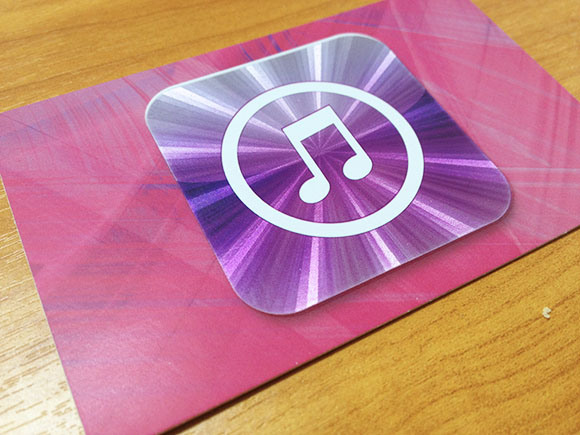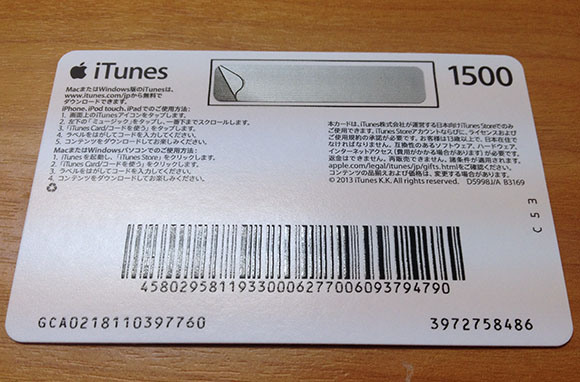
There are quite a few people who immediately turn to the Internet for advice, which, in general, isn’t necessarily a bad thing. Posting a quick question on Twitter or Facebook can net you a large pool of helpful responses, provided you have the right friends.
That said, you really need to be careful about what you post and how, as one Japanese woman learned the hard way after posting her brand new iTunes card numbers when seeking advice about how to register them.
“I don’t know how to use this iTunes card!”
One Japanese Internet user tweeted out, “My papa bought me these cards! But I’m not sure how to use them… LOL” along with a photo of the two cards.
But people tweet pictures of their new stuff all the time, right? It’s not like she posted pictures revealing the iTunes codes printed on the cards.
Oh, no, wait, nevermind. That’s exactly what she did.
For those of you who haven’t used them (Hark! A mythical creatures doth appear!), iTunes cards have secret codes printed on the back. You can buy the cards with cash and then use the code numbers to add money to your iTunes account if you don’t have a credit card or simply don’t want Apple to have your credit card number.
So, throwing those numbers all over the Twitterverse is entirely as bad of an idea as it sounds. And it sounds as bad of an idea as blowing compressed air into your butt.
“Delete that immediately!!”
The woman’s followers, it turns out, are mostly decent human beings and immediately replied, telling her to delete the photos. The woman was probably baffled, but she responded right away to get rid of them.
Obviously, this is not where our story ends.
Too little, too late…
Unfortunately, she was too late. Another Twitter user tweeted at her, “Thanks, stupid woman! Lolol! All your numbers are belong to me! Well, I guess this is also kind of a good lesson. Thanks for the ‘magic stone.’” The “magic stone” seems to be a reference to the smartphone game Puzzle & Dragons, where defeated opponents drop “magic stones” which a beneficial to players.
The woman immediately responded, “Give it back!” and then “It’s gone…”
Obviously, some low, dirty scoundrels used the iTunes codes for themselves.
“Are you happy now??”
Frustrated with the theft of her codes, she tweeted the following.
“Well, fine, I guess I’m just stupid. But you’re just horrible.”
“If you commit this kind of theft again, that’d just be unforgivable.”
“Do you enjoy doing this kind of stuff? I don’t care about my stuff, but don’t do this kind of thing anymore!”
“Please apologize!”
Account shutdown
The account of the user who stole the codes has since been frozen. And, with the encouragement of her followers, it seems like the woman started feeling better.
However, as wrong as it was for someone to steal her iTunes codes, it’s important to remember that not everyone on the Internet is your pal, especially when anonymity has a habit of making people say and do extremely idiot things online. As painful or shocking as it may be to admit, this is probably something that should be common knowledge by now.
Maybe it’s time to start adding basic Internet security to the school curriculum?
Featured image source: Wikipedia (Edited by RocketNews24)
All other images: RocketNews24
[ Read in Japanese ]



 “If I don’t download free music, I’ll get bullied!” – IT worker’s experience with net-using kids
“If I don’t download free music, I’ll get bullied!” – IT worker’s experience with net-using kids Woman makes Fate/Grand Order fan husband a beautiful present; boosts debuff resistance by 5%
Woman makes Fate/Grand Order fan husband a beautiful present; boosts debuff resistance by 5% App that buys your receipts crashes within hours of release due to too many users
App that buys your receipts crashes within hours of release due to too many users Mr. Sato divulges the contents of a 2015 Apple Store Lucky Bag–will he get a lame t-shirt again?
Mr. Sato divulges the contents of a 2015 Apple Store Lucky Bag–will he get a lame t-shirt again? Line up in the hall, open your shirts, show your bras – Real instructions from one Japanese school
Line up in the hall, open your shirts, show your bras – Real instructions from one Japanese school McDonald’s new Happy Meals offer up cute and practical Sanrio lifestyle goods
McDonald’s new Happy Meals offer up cute and practical Sanrio lifestyle goods More foreign tourists than ever before in history visited Japan last month
More foreign tourists than ever before in history visited Japan last month Starbucks reopens at Shibuya Scramble Crossing with new look and design concept
Starbucks reopens at Shibuya Scramble Crossing with new look and design concept Is the new Shinkansen Train Desk ticket worth it?
Is the new Shinkansen Train Desk ticket worth it? The oldest tunnel in Japan is believed to be haunted, and strange things happen when we go there
The oldest tunnel in Japan is believed to be haunted, and strange things happen when we go there Dogs now allowed on Catbus! Ghibli Park vehicles revise service animal policy
Dogs now allowed on Catbus! Ghibli Park vehicles revise service animal policy Our reporter takes her 71-year-old mother to a visual kei concert for the first time
Our reporter takes her 71-year-old mother to a visual kei concert for the first time Arrest proves a common Japanese saying about apologies and police
Arrest proves a common Japanese saying about apologies and police Hey, Japanese taxi driver! Take us to your favorite restaurant in Tsuruga City!
Hey, Japanese taxi driver! Take us to your favorite restaurant in Tsuruga City! “Half-naked men only in loincloths” drum battle returns to Hida festival for first time in five years
“Half-naked men only in loincloths” drum battle returns to Hida festival for first time in five years Disney princesses get official manga makeovers for Manga Princess Cafe opening in Tokyo
Disney princesses get official manga makeovers for Manga Princess Cafe opening in Tokyo We try out “Chan Ramen”, an underground type of ramen popular in the ramen community
We try out “Chan Ramen”, an underground type of ramen popular in the ramen community Foreign English teachers in Japan pick their favorite Japanese-language phrases【Survey】
Foreign English teachers in Japan pick their favorite Japanese-language phrases【Survey】 Beautiful new Final Fantasy T-shirt collection on the way from Uniqlo【Photos】
Beautiful new Final Fantasy T-shirt collection on the way from Uniqlo【Photos】 There’s a park inside Japan where you can also see Japan inside the park
There’s a park inside Japan where you can also see Japan inside the park New Studio Ghibli bedding sets are cool in all senses of the word
New Studio Ghibli bedding sets are cool in all senses of the word Japanese convenience store packs a whole bento into an onigiri rice ball
Japanese convenience store packs a whole bento into an onigiri rice ball Hanton rice — a delicious regional food even most Japanese people don’t know about, but more should
Hanton rice — a delicious regional food even most Japanese people don’t know about, but more should New Pokémon cakes let you eat your way through Pikachu and all the Eevee evolutions
New Pokémon cakes let you eat your way through Pikachu and all the Eevee evolutions Hamburg and Hamburg Shibuya: A Japanese restaurant you need to put on your Tokyo itinerary
Hamburg and Hamburg Shibuya: A Japanese restaurant you need to put on your Tokyo itinerary Studio Ghibli releases Kiki’s Delivery Service chocolate cake pouches in Japan
Studio Ghibli releases Kiki’s Delivery Service chocolate cake pouches in Japan Japan’s bone-breaking and record-breaking roller coaster is permanently shutting down
Japan’s bone-breaking and record-breaking roller coaster is permanently shutting down New definition of “Japanese whiskey” goes into effect to prevent fakes from fooling overseas buyers
New definition of “Japanese whiskey” goes into effect to prevent fakes from fooling overseas buyers Foreign passenger shoves conductor on one of the last full runs for Japan’s Thunderbird train
Foreign passenger shoves conductor on one of the last full runs for Japan’s Thunderbird train Our Japanese reporter visits Costco in the U.S., finds super American and very Japanese things
Our Japanese reporter visits Costco in the U.S., finds super American and very Japanese things Kyoto bans tourists from geisha alleys in Gion, with fines for those who don’t follow rules
Kyoto bans tourists from geisha alleys in Gion, with fines for those who don’t follow rules Studio Ghibli unveils Mother’s Day gift set that captures the love in My Neighbour Totoro
Studio Ghibli unveils Mother’s Day gift set that captures the love in My Neighbour Totoro Domino’s Japan now sells…pizza ears?
Domino’s Japan now sells…pizza ears? New Japanese KitKat flavour stars Sanrio characters, including Hello Kitty
New Japanese KitKat flavour stars Sanrio characters, including Hello Kitty Kyoto creates new for-tourist buses to address overtourism with higher prices, faster rides
Kyoto creates new for-tourist buses to address overtourism with higher prices, faster rides Sales of Japan’s most convenient train ticket/shopping payment cards suspended indefinitely
Sales of Japan’s most convenient train ticket/shopping payment cards suspended indefinitely Sold-out Studio Ghibli desktop humidifiers are back so Totoro can help you through the dry season
Sold-out Studio Ghibli desktop humidifiers are back so Totoro can help you through the dry season Japanese government to make first change to romanization spelling rules since the 1950s
Japanese government to make first change to romanization spelling rules since the 1950s Ghibli founders Toshio Suzuki and Hayao Miyazaki contribute to Japanese whisky Totoro label design
Ghibli founders Toshio Suzuki and Hayao Miyazaki contribute to Japanese whisky Totoro label design Doraemon found buried at sea as scene from 1993 anime becomes real life【Photos】
Doraemon found buried at sea as scene from 1993 anime becomes real life【Photos】 Tokyo’s most famous Starbucks is closed
Tokyo’s most famous Starbucks is closed One Piece characters’ nationalities revealed, but fans have mixed opinions
One Piece characters’ nationalities revealed, but fans have mixed opinions We asked a Uniqlo employee what four things we should buy and their suggestions didn’t disappoint
We asked a Uniqlo employee what four things we should buy and their suggestions didn’t disappoint Princesses, fruits, and blacksmiths: Study reveals the 30 most unusual family names in Japan
Princesses, fruits, and blacksmiths: Study reveals the 30 most unusual family names in Japan Studio Ghibli’s new desktop Howl’s Moving Castle will take your stationery on an adventure
Studio Ghibli’s new desktop Howl’s Moving Castle will take your stationery on an adventure aDanza: Japan’s wild music player app featuring dancing alpacas, sumo wrestlers and more! 【Video】
aDanza: Japan’s wild music player app featuring dancing alpacas, sumo wrestlers and more! 【Video】 How to rob an idol singer otaku: Look up the birthday of his favorite idol
How to rob an idol singer otaku: Look up the birthday of his favorite idol Hulu Japan to give all customers 1,000-yen apology for recent problems
Hulu Japan to give all customers 1,000-yen apology for recent problems Japanese student draws functional QR code on school chalkboard, you’ll never guess where it leads
Japanese student draws functional QR code on school chalkboard, you’ll never guess where it leads Crows in Japan spotted playing with Yu-Gi-Oh! cards, may have exploitable bias in deck-building
Crows in Japan spotted playing with Yu-Gi-Oh! cards, may have exploitable bias in deck-building What happens when you try buying 5,000 followers on Instagram? Our reporter finds out【Experiment】
What happens when you try buying 5,000 followers on Instagram? Our reporter finds out【Experiment】 Three-year-old Japanese girl loves Grand Theft Auto, dad says it’s a great game for kids
Three-year-old Japanese girl loves Grand Theft Auto, dad says it’s a great game for kids Hyogo man arrested for stealing over 1,000 New Year greeting cards to “distract from loneliness”
Hyogo man arrested for stealing over 1,000 New Year greeting cards to “distract from loneliness” Check out Utada Hikaru’s unique 360-degree making-of video for her song “A Bouquet for You”
Check out Utada Hikaru’s unique 360-degree making-of video for her song “A Bouquet for You” Manga artist wants Japanese teachers to feel, for two seconds, how dumb their girls’ dress code is
Manga artist wants Japanese teachers to feel, for two seconds, how dumb their girls’ dress code is VR and GPS combine for new Japanese castle and historical landmark sightseeing app
VR and GPS combine for new Japanese castle and historical landmark sightseeing app Japan Airlines adds a dash of magic to promote its new credit card【Video】
Japan Airlines adds a dash of magic to promote its new credit card【Video】 Japanese Internet users amused by CIA Twitter feed, led there by United States Forces
Japanese Internet users amused by CIA Twitter feed, led there by United States Forces Math-solving phone app is the quickest way to self-study, skip homework, and/or fail your tests
Math-solving phone app is the quickest way to self-study, skip homework, and/or fail your tests Oita woman loses lawsuit and pays damages without ever knowing she’d been sued
Oita woman loses lawsuit and pays damages without ever knowing she’d been sued
Leave a Reply